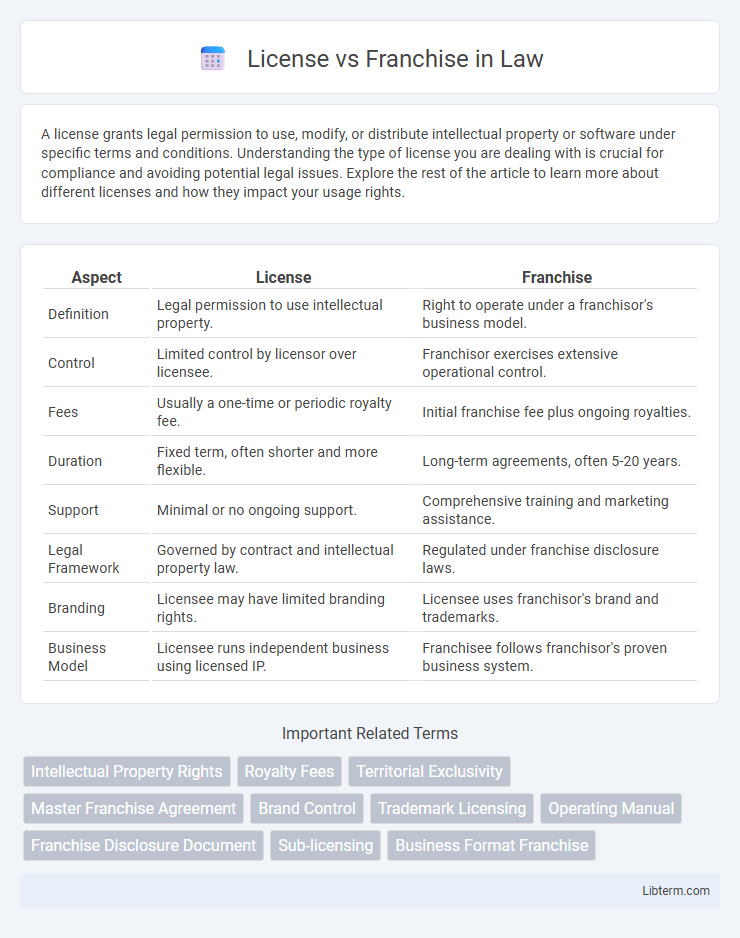A license grants legal permission to use, modify, or distribute intellectual property or software under specific terms and conditions. Understanding the type of license you are dealing with is crucial for compliance and avoiding potential legal issues. Explore the rest of the article to learn more about different licenses and how they impact your usage rights.
Table of Comparison
| Aspect | License | Franchise |
|---|---|---|
| Definition | Legal permission to use intellectual property. | Right to operate under a franchisor's business model. |
| Control | Limited control by licensor over licensee. | Franchisor exercises extensive operational control. |
| Fees | Usually a one-time or periodic royalty fee. | Initial franchise fee plus ongoing royalties. |
| Duration | Fixed term, often shorter and more flexible. | Long-term agreements, often 5-20 years. |
| Support | Minimal or no ongoing support. | Comprehensive training and marketing assistance. |
| Legal Framework | Governed by contract and intellectual property law. | Regulated under franchise disclosure laws. |
| Branding | Licensee may have limited branding rights. | Licensee uses franchisor's brand and trademarks. |
| Business Model | Licensee runs independent business using licensed IP. | Franchisee follows franchisor's proven business system. |
Understanding the Basics: What is a License vs Franchise?
A license grants permission to use intellectual property, such as trademarks or patents, under specific terms without transferring ownership, often for limited purposes and durations. A franchise is a broader business model where the franchisor allows the franchisee to operate under its brand, providing support, training, and a proven system in exchange for fees. The key difference lies in control and relationship: licensing focuses on rights to use assets, while franchising encompasses comprehensive business operation rights and obligations.
Key Differences Between Licensing and Franchising
Licensing grants permission to use intellectual property, such as trademarks or patents, while franchising provides the right to operate a complete business model under an established brand. Licensing typically involves lower initial investment and less control over operations, whereas franchising requires adherence to strict operational guidelines and support systems. Franchise agreements often include ongoing fees and extensive training, distinguishing them from licensing agreements that generally focus on royalty payments for use of the licensed asset.
Legal Structure and Agreements
A license grants permission to use intellectual property under specific terms without transferring ownership, typically involving a straightforward contractual agreement. A franchise establishes a complex legal structure where the franchisor provides the franchisee with a branded business model, ongoing support, and strict operational controls under a comprehensive franchise agreement. Franchise agreements include detailed provisions on fees, training, advertising, and territory rights, making them more regulated and legally binding compared to licensing contracts.
Control and Operational Autonomy
Licenses grant the licensee limited rights to use intellectual property with significant operational autonomy, allowing independent management of business practices. Franchises impose strict control over operational procedures, branding, and marketing to maintain consistency across all franchise locations. The franchisor enforces detailed operational guidelines, whereas licensors typically do not oversee day-to-day business operations.
Revenue Models: Fees, Royalties, and Payments
License agreements typically generate revenue through upfront fees and ongoing royalties based on product sales or usage rights, providing licensors steady income with minimal operational involvement. Franchise models require franchisees to pay an initial franchise fee plus ongoing royalties calculated as a percentage of gross sales, ensuring franchisors continuous revenue streams and brand control. Both structures rely on periodic payments, but franchises often involve higher fees and stricter operational guidelines to maintain brand consistency and market presence.
Brand and Intellectual Property Usage
Licenses grant permission to use intellectual property such as trademarks or patents without transferring brand ownership, enabling limited rights for a specified purpose or duration. Franchises involve a comprehensive use of a brand, including business model, trademarks, and operational guidelines, providing franchisees with ongoing support and brand consistency. Intellectual property in franchising is closely managed to maintain brand reputation, while licensing primarily focuses on controlled usage rights.
Support and Training: What’s Included?
License agreements typically provide limited support and training, focusing mainly on the rights to use intellectual property with minimal ongoing assistance. Franchise agreements include comprehensive support and training programs, covering initial setup, operational guidance, marketing strategies, and continuous assistance to ensure consistent brand standards. Franchisees benefit from structured training modules and dedicated support teams, whereas licensees must often rely on self-management or optional, less extensive services.
Risk and Liability Considerations
License agreements typically involve lower risk and liability for licensors since the licensee operates independently and assumes most operational risks. Franchise agreements impose higher liability on franchisors due to greater control over franchisee operations and brand representation, which can lead to increased legal exposure. Understanding the extent of operational control and contractual obligations is essential for managing risk in both licensing and franchising arrangements.
Pros and Cons: License vs Franchise
Licenses offer lower startup costs and greater operational control but come with limited brand recognition and market support compared to franchises. Franchises provide strong brand identity, comprehensive training, and ongoing support, yet require higher fees and stricter adherence to corporate policies. Choosing between a license and a franchise depends on balancing initial investment, autonomy, and the value of established brand reputation.
Choosing the Right Model for Your Business
Choosing between a license and a franchise depends on the level of control and investment you seek for your business model. A license offers flexibility with minimal oversight, ideal for those wanting to use a brand or product without strict operational guidelines. Franchising involves comprehensive support and stricter control, suitable for entrepreneurs looking for a proven business system with ongoing training and marketing resources.
License Infographic

 libterm.com
libterm.com